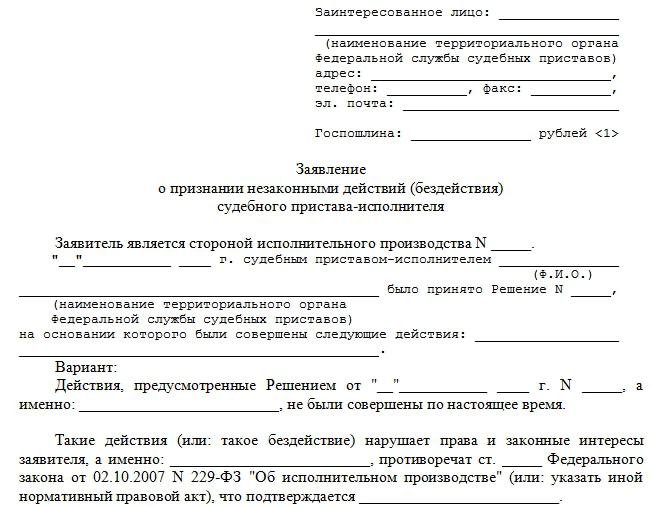Inaction of the bailiff is not uncommon in today's time. Situations when representatives of the executive service refuse to perform their duties efficiently can hardly be called legitimate. How to overcome the inaction of bailiffs? What should an ordinary citizen do in such situations? Answers to all these questions will be provided in the article.
About the fact of inaction
How to write a complaint about the inaction of the bailiffs will be described later. At first, it’s worth understanding what inaction is all about. If we turn to the theory of law, then inaction means the failure by officials to fulfill their duties. Moreover, inaction largely violates the rights of third parties.
A very simple example: the bailiffs have only 3 days to complete a certain paperwork, but the body itself does not show absolutely any activity. Illegal inaction, therefore, begins to manifest itself on the fourth day.
Thus, inaction refers to non-fulfillment of official duties that entails harm to third parties.
Who can file a complaint?
Before you begin figuring out where to file a complaint, you should raise an equally important question: who is able to file a complaint? If you look at judicial practice, it will be easy to notice how representatives of the judicial process make gross errors in their work.
Moreover, these errors often affect people who are not directly related to the trial. Any entities whose rights have been violated have the right to appeal the actions of the bailiffs.
Where to write a complaint?
As a rule, a complaint is submitted to the head of the person whose actions appear to be unlawful to the applicant. The same principle can be applied in the case of bailiffs. But, as it usually happens, in court proceedings everything is not so simple. Often the inaction of an official is not his own initiative. The employee may be happy to help, but bosses forbid him. In such cases, an application for the inaction of the bailiffs cannot be submitted to the same authorities: it will simply be pointless.
What to do in such situations? Where should I go? To begin with, it’s worth looking at all the available documentation related to the problem in one way or another. The following acts can be distinguished here:
- about the postponement or refusal of execution;
- on coercive measures in the production of an executive type;
- transfer of production to other departments;
- the impossibility of making a decision;
- on the suspension of legal proceedings.

This list clearly illustrates the fact that inaction of bailiffs can be caused by various reasons. So where is the complaint worth writing? First you have to turn to the bailiffs' guide. If this action does not succeed, you will have to contact the prosecutor's office or higher authorities.
Application deadlines
This legislation establishes a ten-day period for appealing against the actions or omissions of representatives of the executive body. At the same time, the beginning of the required period is considered the day when a person learned about a violation of rights. The term cannot be restored due to the legal illiteracy of the applicant. Does this mean that a person will not be able to overcome the inaction of the judiciary? What to do in such a situation? 
To begin with, it is worth paying attention to possible valid reasons for the restoration of the term. These include:
- applicant's illness;
- finding him on a business trip;
- the letter sent by the applicant did not reach the right address.
Thus, it is necessary to start appealing the illegal actions of the bailiffs as soon as possible.
What should be the complaint?
What to do with the inaction of the bailiffs? It should not go unpunished. What needs to be done in order for the complaint to come to the address and be considered by the relevant persons? It is necessary to properly execute it. So, the appeal should not contain insults, abusive expressions and swearing. The applicant, no matter how angry he is, must be in control.

The complaint should be as clear as possible. The document indicates specific facts of violation of rights. Persons to whom the complaint is addressed should have a clear idea of what happened. The complaint structure is as follows:
- a description of everything that happened;
- indication of specific facts of inaction of the contractor;
- transfers of rights and interests violated by a representative of the judicial system;
- specific requirements for the implementation of certain actions, please take appropriate measures.
This should be a complaint about the inaction of the bailiffs, a sample of which can be seen below.

The application must indicate the applicant’s phone number.
How to file a complaint about the inaction of the bailiffs?
What to do after writing a complaint? You need to decide where exactly the paper will go. If the head of the department, then it is worth considering that the application should contain specific requirements; if the prosecutor’s office, then you need to pay attention to violated rights and the request for their restoration; if the application is sent to court, you will have to explain why the actions of the performer seem to the applicant to be illegal.
You can file a complaint in a variety of ways. The first and most convenient option is via the Internet. To do this, you will have to go to the website of the relevant authority and find the “file a complaint” column. The second option is a written appeal. Paper must be submitted either directly to the department or by registered mail. In this case, a copy of the submitted application is best left with you. As soon as officials receive a complaint, the complainant will be notified.
It is advisable to attach any documents to the application confirming the fact of the offense.
Complaint
Consideration of the submitted application in different instances is significantly different. So, if the complaint comes to the senior bailiff, the department head will be required to conduct an internal audit. The guilty official will be obliged to pay damages. A complaint to the prosecutor about the inaction of the judiciary will entail a 30-day period of consideration and confirmation of the fact of the offense. The prosecutor may:
- reverse an illegal decision;
- announce a warning;
- make demands or submissions, etc.
It is also possible that the bailiff who violated the applicant’s rights will be brought to disciplinary action. Finally, if the applicant lodges a complaint with the court, the procedure will be as follows:
- the court will accept the complaint;
- seeks documentation;
- hears the views of the parties;
- decides.
It is worth noting that appeal to the courts has both advantages and disadvantages. They will be described later.
Judicial Impact
Appeal to the courts with a complaint about the inaction of executive persons has the following disadvantages:
- the court, unlike the prosecutor, does not give specific instructions on the performance of certain actions;
- cannot establish a special period for this;
- sometimes it cannot punish the bailiff at all.

As a rule, the court tries to make a decision on the unlawfulness of the inaction of the bailiffs, after which it assigns obligations to eliminate violations. But the requirements put forward are, as a rule, not specific. But the appeal to the court also has some advantages.In particular, it is worth highlighting the possible compensation for moral harm and the short duration of the whole process.